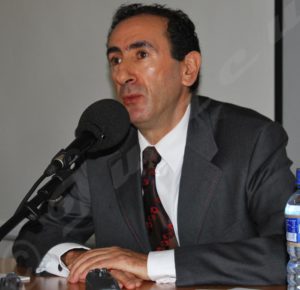On 15 May, the Commission of Inquiry on Human rights in Burundi has presented the second oral briefing to the UN Human Right Council. Members of the commission say human right violations persist. Burundi Government accuses the commission of producing biased and politically oriented reports.

Fatsah Ouguergouz, chairman of Commission of Inquiry on Burundi
“We were struck in our investigations by the feeling of deep and widespread fear running through the testimonies we gathered,” said Fatsah Ouguergouz, Reine Alapini Gansou and Françoise Hampson, members of the Commission of Inquiry on Burundi, during the presentation of their second oral briefing to the Human Rights Council.
“Today we can say that our initial fears concerning the scope and gravity of human rights violations and abuses in Burundi since April 2015 have been confirmed”, they say.
The Commission regrets once again its lack of access to the country and the Burundian Government’s lack of cooperation.
They said they interviewed many Burundians in exile and visited Tanzania, Rwanda, Uganda, the Democratic Republic of Congo and Kenya, among other countries.
Since the beginning of our investigations, we have collected more than 470 testimonies of human rights violations allegedly committed in Burundi since April 2015, say members of the Commission of Inquiry.
They say these violations include extrajudicial executions, acts of torture and other inhuman and degrading treatment, sexual and gender-based violence, arbitrary arrests and detention and enforced disappearances, often accompanied by demands for large ransoms from families in exchange for promises to release detainees or to find those who have disappeared.
“Many of these violations have been committed by members of the National Intelligence Service and the police, sometimes assisted by members of the youth league of the ruling party, the Imbonerakure”, members of the commission say.
They also say they received testimonies alleging the use, during torture sessions, of clubs, rifle butts, bayonets, iron bars, metal chains and electric cables with the result that some victims’ bones were broken and other victims lost consciousness; needles stuck into victims’ bodies or unidentified products injected into them; nails ripped out with pliers; burns; and many abuses inflicted on male detainees’ genital organs.
According to members of the commission, these human rights violations are reinforced by hate speech, sometimes with an ethnic dimension, delivered by certain state officials and members of the ruling party.
Burundi Government accuses the commission of inquiry of being biased
A day before the Commission of Inquiry presented the second oral briefing to the Human Right Council; Burundi Minister of Human Rights accused this commission of producing biased and politically oriented report. “The objective of these reports is apparently trying to incriminate the civilian, military and police authorities as the perpetrators of human rights violations in Burundi,” said Nivyabandi. He also said the commission of inquiry was set up through the European Union influence.
The Human Rights Council has established the Commission of Inquiry on Burundi through resolution 33/24 of 30 September 2016. The Commission has a one-year mandate. It is tasked to conduct a thorough investigation into human rights violations and abuses in Burundi since April 2015, identify alleged perpetrators of human rights violations and abuses in Burundi with a view to ensuring full accountability. It has presented an oral briefing to the Human Rights Council at its thirty-fourth session and thirty-fifth sessions, and will present a final report during an interactive dialogue at its thirty-sixth session.
Since the establishment of that commission, Burundi Government refused to collaborate with it. Martin Nivyabandi, Burundi Minister of Human Rights said this commission is not necessary in Burundi since the Burundian Government can ensure the security for its citizens.



















 IWACU Open Data
IWACU Open Data

